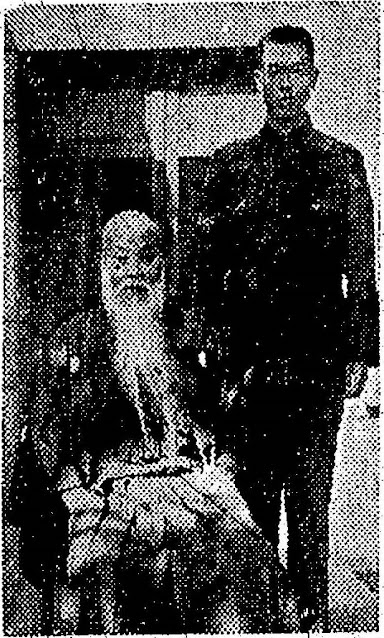I came across another fascinating 1943 article from Keijo Nippo, a known propaganda tool for the Imperial Japanese regime during their colonial rule over Korea. This article sheds light on Park Chun-geum (박춘금, 朴春琴) (1891-1973), a notable Korean politician who became the first Korean member of Japan's Imperial Diet before World War II.
 |
| Park Chun-geum with his son Park Chun-ung in the lower left corner. |
Even though residents of the Imperial Japanese colonies of Korea and Taiwan were barred from voting or running for office in the Imperial Diet, Korean and Taiwanese men who resided in mainland Japan were allowed to vote and run for office, which allowed Park Chun-geum to become elected to the House of Representatives in Tokyo's 4th district in 1932 and 1937. By 1943, Park Chun-geum was already out of office, but he was still an influential figure who was given special praise and adulation in the Imperial Japanese press. This 1943 article highlights Park Chun-geum sending off his only son, Park Chun-ung (박춘웅, 朴春雄), to be deployed in the Imperial Army during World War II. This is the only source I could find which mentions his son Park Chun-ung, making it particularly remarkable.
Interestingly, a 1957 Japanese news article mentions a man named Park Chun-ung with the same Hanja characters (朴春雄) in the name, who was involved in a North Korean covert international amphibious operation known in Japan as the Shinkomaru Incident. This Park Chun-ung was a chief engineer on a North Korean spy ship, Shinkomaru, who successfully contacted another agent at a Shinto shrine in Ine Port in Kyoto Prefecture and smuggled him onto the spy ship on November 28, 1957. The Hanja of their names match exactly, and both have military backgrounds, raising intriguing questions.
Could the Park Chun-ung from 1943 be the same person mentioned in 1957? The age difference makes it plausible. In 1943, Park Chun-ung was 23 years old, and by 1957, he would have been 37, still physically capable of participating in covert operations.
It would be enlightening to access North Korean archives or speak with knowledgeable individuals to determine if these two references to Park Chun-ung indeed point to the same person. Such information could reveal whether he is regarded as a hero or a traitor within the official historical narrative of North Korea.
[Translation]
Gyeongseong Ilbo (Keijo Nippo) November 7, 1943
Long-Distance Call to His Only Son
Former Parliamentarian Park Encourages His Son Headed to the Front Lines
The fighting spirit of students departing for battle, determined to sacrifice their lives for the nation, continues to burn fiercely with time. The Korean Peninsula is now swept up in a whirlwind of emotion, urging everyone to go forth to the decisive battlefields. There is no room for hesitation, not even for a single moment, despite him being the only son, with no brothers or sisters. The demands of the fathers and the voices of the mothers of the 25 million on the Korean peninsula is clear: "Go forth to the decisive battlefields and let the sparks of manhood shine."
Park Chung-Geum, known as the first Korean person to serve in the Imperial Japanese Diet, lost his second son, Ho-ung (호웅, 虎雄), last year while he was studying at Keio University. His only surviving son, 23-year-old Chun-ung (춘웅, 春雄), a third-year student in the Faculty of Economics at Rikkyo University, has now taken up the call. "I will go," he proclaimed boldly as he knocked on the door of glory. When visited on the 6th at his home in 25 Ihwa-dong, Jongno-gu, Seoul, Park Chung-geum spoke with a smile.
"Oh, what a good feeling it is! I just encouraged him over the phone. I told him he must definitely perform admirably as a member of the vigorous Imperial Army. It is not just because he is my son, but because he is a young man that I raised myself. I am sure he will achieve great deeds and repay even a fraction of the Emperor’s benevolence. It is only natural for him to do so as my only son. What is the point of being born a man if you cannot respond to this honor? Those who have received education at specialized schools and universities are the leaders of the future. How can they become leaders without experiencing the baptism of fire in this critical, life-or-death battle?"
"The battlefield is where the best leaders are forged. For us Koreans, the gateway to glory, long-awaited by 25 million people, fully opened on August 1st with the implementation of the conscription system and the special volunteer system for the navy, which we welcomed with tears of joy. The students’ noble act this time is paving the way for this path of glory. Next year, their younger brothers will courageously follow. What a magnificent sight it will be. It is truly moving to witness the grand benevolence of the Emperor. Now is the time for the students to respond to this vast and boundless Imperial grace. What does it matter if he is an only son? Does being an only son mean he should not be granted the honor of this glory?" [Photo: Park Chung-Geum speaking with joy, and Chun-ung]
[Transcription]
京城日報 1943年11月7日
一人息子へ長距離電話
征く令息へ朴元代議士が激励
出陣学徒殉国の闘魂は時とともに燃え沸り俺も征く君も征けといま半島は感激の旋風に包まれて一人息子だから姉も妹もないたった一人の子だからなど寸刻の躊躇も許されない。征け決戦戦場に征って男の火花を咲かせよとは半島二千五百万の父の要求、母の声でもあるのだ。
半島最初の議政壇上の人として知られる朴春琴氏は昨年慶応大学在学中の次男虎雄君を亡くし、立教大学経済学部三年に在学の春雄君(23)が総てをたのむたった一人の息子であったが、その春雄君も『僕は征くぞ』と颯爽と栄光の門を叩いて名乗りをあげた。六日京城府鐘路区梨花町25の父春琴氏を訪ねると誉の父は莞爾として語る。
ああいい気持ちだ。さっき電話で激励したばかりだが、精強の皇軍将兵の一員として必ず立派な働きをしなければ承知しないといってやった。自分の子だからいうわけではないが、いや余が育てた伜だ。きっと華々しい手柄をたてて皇恩の万分の一でもお酬いしてくれることと思う。なに一人息子でよくもだってあたり前のことだ。この光栄に応えないで男と生れた甲斐が何処にあるというのだ。第一考へでも見給え専門学校大学の教育を受けているものは将来の指導階級だ。それがこの生きるか滅びるかの瀬戸際の決戦に砲弾の洗礼を受けずして何の指導者となれるか。
戦場こそは最良の指導者を鍛え上げるのだ。われわれ半島人の立場からも半島二千五百万蒼生が待ちに待った光栄の門は去る八月一日、われわれが随喜の涙して迎えた徴兵制、海軍特別志願制の実施によって全く開かれたのであるが、今度の学徒諸君の之はその光栄の道を地均しするものだ。その上を来年からは弟たちが勇み立って進んで行くのだ。何という壮観だろう。ただ大御心の有難さに感激するばかりだ。今こそ学徒諸君は広大無辺の大御心にお応えしなければならない時だ。一人息子が何だ。一人息子だからといって光栄の恩沢を頒ち得られぬとでもいうのか。【写真=喜びを語る朴春琴と春雄君】
Source: https://archive.org/details/kjnp-1943-11-07/page/n2/mode/1up






